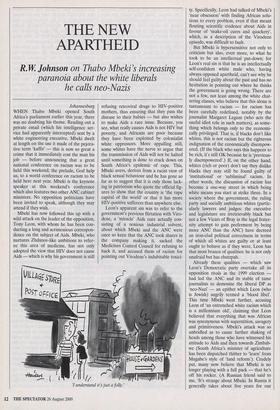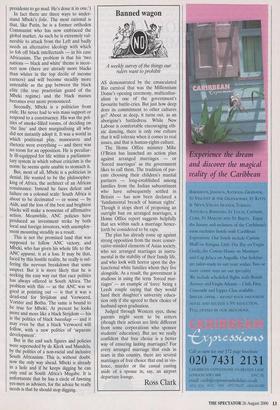THE NEW APARTHEID
R.W. Johnson on Thabo Mbeki's increasing
paranoia about the white liberals he calls neo-Nazis
Johannesburg WHEN Thabo Mbeki opened South Africa's parliament earlier this year, there was no doubting his theme. Reading out a private email (which his intelligence ser- vice had apparently intercepted) sent by a white engineering executive, Mbeki dwelt at length on the use it made of the pejora- tive term taffir' — this is now so great a crime that it immediately cost the man his job — before announcing that a great national conference on racism was to be held this weekend; the prelude, God help us, to a world conference on racism to be held here next year. Mbeki is the keynote speaker at this weekend's conference which also features two other ANC cabinet ministers. No opposition politicians have been invited to speak, although they may attend if they wish.
Mbeki has now followed this up with a wild attack on the leader of the opposition, Tony Leon, with whom he has been con- ducting a long and acrimonious correspon- dence on the subject of Aids. Mbeki, who nurtures Zhdanov-like ambitions to refer- ee this area of medicine, has not only adopted the view that HIV does not cause Aids — which is why his government is still refusing retroviral drugs to HIV-positive mothers, thus ensuring that they pass the disease to their babies — but also wishes to make Aids a race issue. Because, you see, what really causes Aids is not HIV but poverty, and Africans are poor because they have been exploited by colonialist white oppressors. More appalling still, some whites have the nerve to argue that the transmission of Aids will not be halted until something is done to crack down on South Africa's epidemic of rape. This, Mbeki avers, derives from a racist view of black sexual behaviour and he has gone so far as to suggest that it is only those lack- ing in patriotism who quote the official fig- ures to show that the country is 'the rape capital of the world' or that it has more HIV-positive sufferers than anywhere else.
Leon's apparent sin was to refer to the government's previous flirtation with Viro- dene, a 'miracle' Aids cure actually con- sisting of a noxious industrial solvent, about which Mbeki and the ANC were once so keen that the ANC took shares in the company making it, sacked the Medicines Control Council for refusing to back it, and accused them of racism for pointing out Virodene's indubitable toxici- I understand it's just a fo167.' ty. Specifically, Leon had talked of Mbeki's `near obsession' with finding African solu- tions to every problem, even if that meant flouting scientific evidence about Aids in favour of 'snake-oil cures and quackery', which, as a description of the Virodene episode, was difficult to fault.
But Mbeki is hypersensitive not only to criticism but also, even more, to what he took to be an intellectual put-down; for Leon's real sin is that he is an intellectually self-confident white male who, having always opposed apartheid, can't see why he should feel guilty about the past and has no hesitation in pointing out where he thinks the government is going wrong. There are not a few, not least among the white chat- tering classes, who believe that this alone is tantamount to racism — for racism has been carefully redefined, notably by the journalist Margaret Legum (who acts the useful idiot role in such matters), as some- thing which belongs only to the economi- cally privileged. That is, if blacks don't like whites, this is not racism but the righteous indignation of the economically disempow- ered. (If the black who says this happens to be rich, it's still OK because he is 'previous- ly disempowered'.) If, on the other hand, whites (rich or poor) don't say they dislike blacks they may still be found guilty of `institutional' or 'subliminal' racism. In other words, the discussion of racism has become a one-way street in which being white means you start at strike three. In a society where the government, the ruling party and socially ambitious whites (partic- ularly lawyers and judges: the executive and legislature are irretrievably black but not a few Vicars of Bray in the legal frater- nity attempt to gain preferment by being more ANC than the ANC) have decreed an iron-clad political correctness in terms of which all whites are guilty or at least ought to behave as if they were, Leon has that most brazen of qualities: he is not only unafraid but has chutzpah.
Already these qualities — which saw Leon's Democratic party overtake all its opposition rivals in the 1999 election had led the ANC and its stable of tame journalists to demonise the liberal DP as `neo-Nazi' — an epithet which Leon (who is Jewish) angrily termed a 'blood libel'. This time Mbeki went further, accusing Leon of 'an entrenched white racism which is a millennium old', claiming that Leon believed that everything that was African was synonymous with superstition, savagery and primitiveness. Mbeki's attack was so unbridled as to cause further shaking of heads among those who have witnessed his attitude to Aids and then towards Zimbab- we (South Africa's minister of agriculture has been dispatched thither to 'learn' from Mugabe's style of 'land reform'). Crudely put, many now believe that Mbeki is no longer playing with a full pack — that he's off his rocker. (A Russian friend said to me, 'It's strange about Mbeki. In Russia it generally takes about five years for our presidents to go mad. He's done it in one.') In fact there are three ways to under- stand Mbeki's folie. The most rational is that, like Putin, he is a former orthodox Communist who has now embraced the global market. As such he is extremely vul- nerable to attack from the Left and badly needs an alternative ideology with which to fob off black intellectuals — in his case Africanism. The problem is that his 'two nations — black and white' theme is incor- rect now (there are already more blacks than whites in the top decile of income earners) and will become steadily more untenable as the gap between the black elite (the true praetorian guard of the Mbeki regime) and the black masses becomes ever more pronounced.
Secondly, Mbeki is a politician from exile. He never had to win mass support or respond to a constituency. His was the pol- itics of smoke-filled rooms, of deciding on `the line' and then marginalising all who did not instantly adopt it. It was a world in which positional play, manoeuvre and rhetoric were everything — and there was no room for an opposition. He is peculiar- ly ill-equipped for life within a parliamen- tary system in which robust criticism is the norm: he seems quite unable to stomach it.
But, most of all, Mbeki is a politician in denial. He wanted to be the philosopher- king of Africa, the architect of an African renaissance. Instead he faces defeat and failure on a colossal scale: South Africa is about to be decimated — or worse — by Aids, and the loss of the best and brightest blacks will make a nonsense of affirmative action. Meanwhile, ANC policies have produced an investment strike by both local and foreign investors, with unemploy- ment mounting steadily as a result.
This is not the promised land that was supposed to follow ANC victory, and Mbeki, who has given his whole life to the ANC apparat, is at a loss. It may be that, faced by this hostile reality, he really is suf- fering the nervous breakdown that some suspect. But it is more likely that he is seeking the easy way out that race politics has always offered in South Africa. The problem with this — as the ANC was so good at pointing out — is that it was a dead-end for Strijdom and Verwoerd, Vorster and Botha. The same is bound to be true for Mbeki. At present he looks more and more like a black Strijdom — his is the politics of black baasskap — and it may even be that a black Verwoerd will follow, with a new politics of 'separate development'.
But in the end such figures and policies were superseded by de Klerk and Mandela, by the politics of a non-racial and inclusive South Africanism. This is, without doubt, now the only way ahead. Mbeki is already in a hole and if he keeps digging he can only end as South Africa's Mugabe. It is unfortunate that he has a circle of fawning yes-men as advisers, for the advice he really needs is that he should stop digging.



























































 Previous page
Previous page